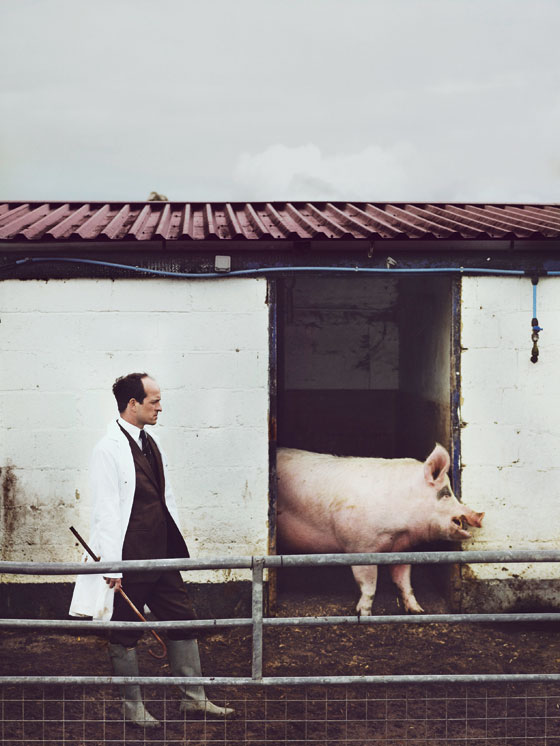
Matthew Herbert is an electronic musician with a lot of rules. For one thing, he doesn’t work with any sounds he didn’t go out and collect himself with a microphone. For another, the sounds he collects are rigorously thematic: He’s made intimate house music from recordings of the human body, he’s collected politically weighted samples (like a match struck in the Houses of Parliament) and made big-band records about the Iraq War, and he once made a record about food and ecology out of the sounds of factory chickens and coffee beans. For his latest experiment, a decidedly non-pop album called One Pig, Herbert set out to create the “biography” of a farm animal: recording the life of a single pig—from birth to sty to pan to plate—then stitching all that rustling, grunting, clanking, and sizzling together into a musical chronology you might describe as “ambient” or “industrial,” depending on your inclinations. Only one part is missing. As it turns out, nobody in England will let you record the sound of them slaughtering a pig, and some people will be annoyed with you for trying—even if you think we should all be eating less meat.
I was surprised how angry people were about the project—I’d have thought a group like PETA would want us to know more about where meat comes from.
I’m in the middle of an interview where they’ve had the head of German PETA do a dialogue with me. He’s pleased that I’m drawing attention to pig life but completely antagonistic to how I’ve gone about it. For example, I said, “I’m just witnessing a process,” and he said, “But you’re separating yourself off from any responsibility for that process.” Whereas to me, that rules out war photography, documentaries, journalism … I think it just comes down to the fact that I eat meat, and the pig was eaten.
You spent a lot of time recording this pig. Did you ever feel yourself growing attached, or wanting to name it?
I thought I might, at the beginning. But a name wasn’t appropriate. It wasn’t my pig, it wasn’t a pet, and—most importantly—I don’t think the pig ever really gave a shit about me. For there to be some sort of relationship, the pig needed to be privy to that relationship. I wasn’t feeding it or giving it a run ’round a field, so it had no reason to be attached to me. I was definitely freaked out, though, when it was on its way to the abattoir, and it was really not pleasant to have the pig come back in pieces.
You made instruments out of the pig’s skin and bones, which feels a little grisly—but then I’m wearing a leather belt, so I’m not sure how I can say that. Did it feel sinister to you?
I wouldn’t use the words “sinister” or “grisly.” But there’s a darker quality. To me, that’s what this record is about—it’s about life and death, and those things exist side by side with us all the time. We’ve created a society that’s sort of in denial about that. We do make drum skins from animals. And maybe you’ve come into contact with pig twenty times today, whether it’s in the process used to make milk, or bread, or beer—it’s in the most unlikely places.
A lot of this record is about memory, and generating sounds from the pig’s remains is a way of restimulating that memory. We take the pig drum with us when we perform live. So even though the sounds you’re listening to might be two years old, from when the pig was alive, you’ve still got this remnant of the pig onstage, and the possibility of bringing it to life.
This is a record where you could really use the shape of the music to lead us around emotionally—make parts of the pig’s life sound bucolic, or others dark. But what you’ve come up with feels very neutral.
Virtually every person I speak to describes it in a completely different way. Someone told me it’s unbearably industrial and unpleasant to listen to. Someone else said it’s quiet and ambient and inoffensive. For me, the decision comes entirely from the sounds themselves. That’s a lesson I’ve had to learn and follow for years: that you can’t very convincingly turn a pig rustling in straw into rock and roll. And with this record it’s important to recognize that I don’t speak pig—it’s a biography, so I wanted to let the pig take the lead.
What reasons were you given for not being allowed to record the slaughter?
One has no right to see inside a slaughterhouse, so they’re free to just say no and not give reasons. I don’t know if you know anyone who works in a slaughterhouse, but they’re people of few words.
One Pig.
Matthew Herbert.
Accidental Records.
$8.99.